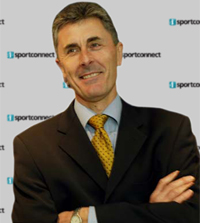Michael Cunnah – Strategic Advisor at iSportconnect
January 31, 2011
By Martin Laurence :
Having previously worked in finance departments at the likes of Coca-Cola and Guinness Ltd. (now Diageo), Michael Cunnah made his first foray into the world of sports with the Football Association (FA) in 1998. He served for three years as the organisation’s Finance Director before being appointed as Chief Executive Officer for Wembley Stadium in 2001. He was also with English Premier League side Aston Villa, where he served as Chief Operating Officer from 2007 to 2008.
Mr Cunnah’s influence in sports and other business sectors continues in an impressive portfolio of non-executive and consultancy roles including Major Events International, Messages to You and International Services Group.
Michael has a BSc Hons degree and is a Fellow of Aston Business School.
You had a long career before entering into sport. Was it a move you always wanted to make?
No, although when it became a real possibility I realised that it was a move that I had to make. I am not the sort of person who would want to spend the rest of my life wondering whether I should have joined The Football Association.
Moving into sport was fantastic for me. Over the last 15 years, sport has become more commercial and is a key sector of industry. Companies in other sectors want to associate themselves with sporting organisations through sponsorship and other commercial deals. It is therefore an exciting and stimulating sector to work in which gives you the feeling that you are “where it is at”. It is a privilege to work in sport and you know that lots of people would swap places.
How does the sports industry compare with the ‘outside world’? Are there many differences between being Finance Director for Diageo or Coca-Cola Schweppes compared to the Football Association?
The biggest difference in my opinion is that my previous companies; Unilever, Diageo and Coca-cola were well resourced. All three are matrix managed organisations with lots of impressive people and experts for everything. Sport is not like that. Sporting organisations, even though they have high profiles, are comparatively small companies and don’t have the same reservoir of executive talent. Each executive in sport needs to be more entrepreneurial and take on more responsibility as there are fewer managers in each team to share the burden. Executives in sport need to be “all-rounders” as they often need to work in areas beyond their original functional specialism.
Sport is an exciting sector where your work can get more profile than it would elsewhere, however this can sometimes be a little uncomfortable! It is not for the faint hearted.
What lessons did you bring with you into the industry?
We all know that organisations need a strategic plan, and I have learned that it is even more important to have a plan to implement the strategic plan. Everything that we do every day needs to be focussed on achieving our long term goals otherwise you have to question why are we doing these things. The CEO is responsible for guiding and coaching his / her team so that across the organisation, decisions are taken which strike the right compromise between short term needs and longer-term success. Good teams are very strict about how they adhere to these principles.
I introduced strategic planning to good effect at The FA and, of course, such a plan was the driving force behind the development of the new Wembley Stadium and its related business.
Some of the organisations you worked for – Coca Cola, Diageo – have a lot of involvement in sport, e.g. through sponsorship. Did that help shape your career path or was it just coincidence?
Only once and, when the opportunity arose, it gave me the confidence to enter sport on a permanent basis. When I was with Diageo I managed the acquisition of Red Stripe and spent a couple of great years working in Jamaica. I was responsible for Red Stripe’s sponsorship of the inter island cricket competition – the famous Red Stripe Trophy. This was at a time when West Indies still had some of the world’s best cricketers and I loved meeting the likes of Curtly Ambrose, Courtney Walsh and a very young Shivnarine Chanderpaul. Also, some of the former players such as Michael Holding and Clive Lloyd were really friendly and very happy to give us the benefit of their experiences.



